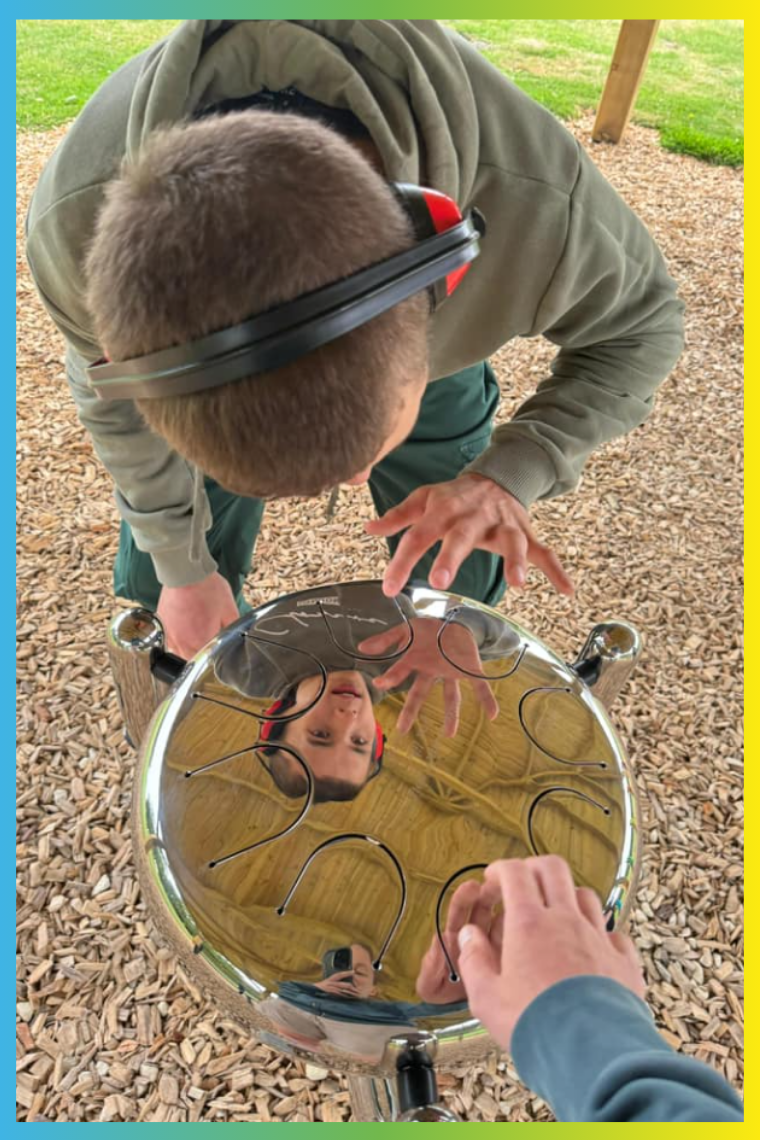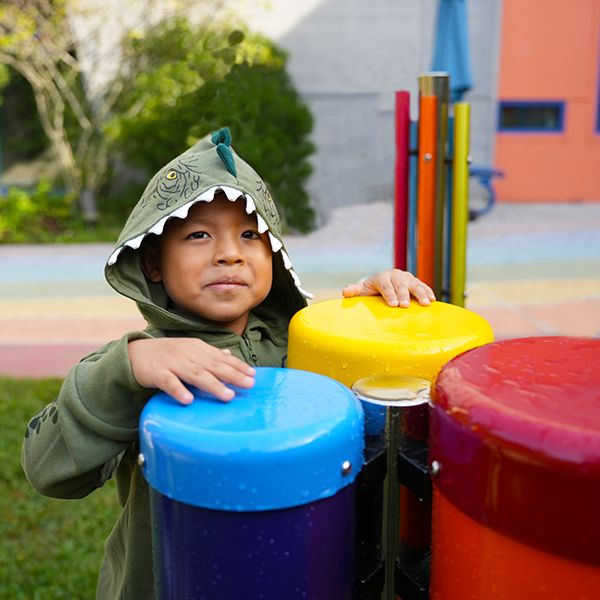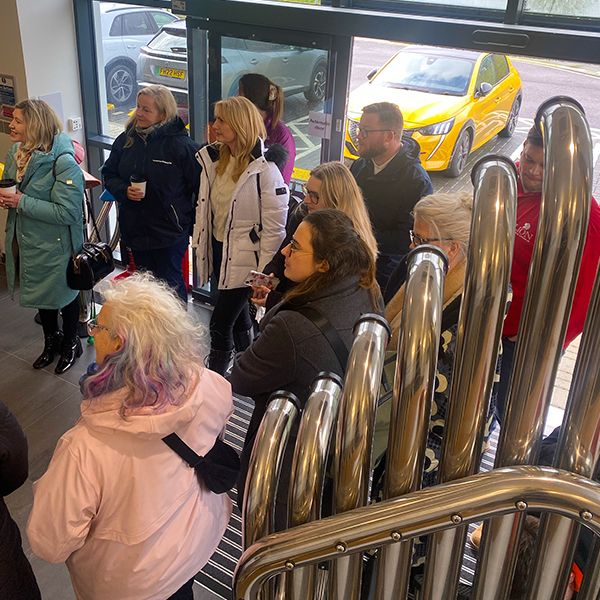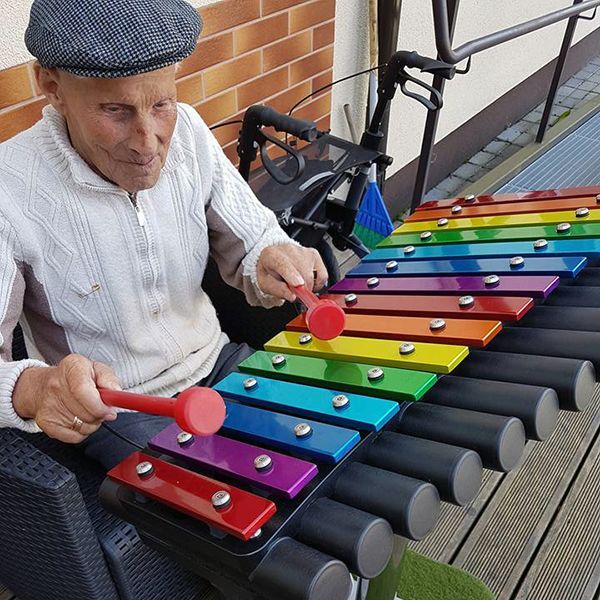
Celebrate Autism Month by exploring how outdoor music-making fosters connections, communication, and inclusion for individuals with autism across all ages and abilities.
April is World Autism Month, and it begins with the United Nations’ World Autism Awareness Day on April 2. This year marks the 18th anniversary of this important observance, which aims to raise awareness, foster understanding, and promote acceptance of individuals with Autism Spectrum Disorder (ASD). As we reflect on the journey toward inclusivity, we focus on the transformative power of music-making, particularly outdoors, for individuals with autism and how it fosters connections across all ages and abilities.
Music therapy has long been recognized as a powerful tool for helping children and adults with autism address cognitive, emotional, and social needs. Studies consistently show that music can bring calm and clarity while also fostering deeper connections between individuals, especially those who might struggle with traditional forms of communication. In particular, engaging in music-making outdoors provides an environment that promotes freedom of expression and interaction in a non-pressuring, sensory-friendly way.
Recent research highlights that playing musical instruments can significantly improve communication skills for those with autism. A unique aspect of outdoor music-making, particularly with accessible, thoughtfully designed instruments, is the emphasis on inclusive engagement. These instruments invite individuals to connect with music and each other while benefiting from the outdoor setting's calming effects. Such environments are proven to reduce stress, improve sensory integration, and enhance attention span—key benefits for individuals with autism.
Autism, a developmental condition that affects individuals differently and to varying degrees, often presents challenges with social interactions, communication, and behavior. However, music provides a bridge, helping to break down communication barriers in nonverbal ways. Playing instruments allows individuals to communicate, even when verbal expression is challenging. Notably, instruments like those designed by Percussion Play—which include outdoor xylophones, chimes, and drums—create opportunities for interaction in an inclusive and accessible way.
Case Study: The Thomas Centre’s Musical Pavilion
A shining example of this transformative approach is the Thomas Centre’s Musical Pavilion, located in the UK. This space has been designed to foster connections among families, especially those with children on the autism spectrum, through interactive outdoor music-making. The center's innovative use of Percussion Play’s outdoor musical instruments helps to create an inclusive environment where music becomes the universal language for communication and engagement.
In the Thomas Centre’s case, their musical pavilion is not just a playground—it's a space where people of all ages and abilities, including individuals with autism, can come together, make music, and build social connections. The beauty of these instruments is that they cater to all skill levels and don’t require previous experience, allowing both children and adults with autism to explore music in a relaxed, non-pressured setting. The community-building aspect of outdoor music-making becomes especially evident here, where the instruments serve as a tool to encourage cooperation, emotional expression, and mutual enjoyment.
Benefits of Outdoor Music for Autism
Social interaction can often be difficult for individuals with autism, but music provides a safe, nonverbal space for expression. Outdoor music-making encourages shared experiences that promote social skills, emotional regulation, and cognitive development. Music-making encourages individuals to engage with their surroundings, practice turn-taking, develop sensory awareness, and experience joy through rhythm and sound.
Particularly in outdoor settings, there are added benefits such as exposure to natural light, fresh air, and open spaces, all of which contribute to emotional well-being. Outdoor instruments designed by companies like Percussion Play help to integrate these benefits into everyday life. These instruments are designed for easy access by people of all ages and abilities, including those with autism. The Duo outdoor xylophone, for example, is designed to be played by multiple users at once, allowing children and adults to play together without the added pressure of direct eye contact, a common challenge for those on the autism spectrum.
Why Music and Outdoor Play Matter for Autism
Engaging with music outdoors on accessible instruments has unique advantages over other forms of therapy. The outdoor environment naturally reduces anxiety, provides a sense of freedom, and encourages engagement through play. For children with autism, the sensory stimulation provided by outdoor music can help to improve their ability to focus and process auditory stimuli. This is especially beneficial for improving communication skills, promoting emotional self-regulation, and developing social bonds.
At Percussion Play, the focus is on creating musical instruments that are durable, weatherproof, and able to withstand constant use by children and adults alike. Their range of instruments promotes collaboration, interaction, and creative expression. Instruments such as the large Babel Drum or the Emperor Chimes provide a rich auditory experience and are specifically designed to cater to different sensory needs. These instruments encourage interaction without being overwhelming, making them a perfect tool for those with autism who may be sensitive to certain sounds or interactions.
A Vision for an Inclusive Future
The ultimate goal of World Autism Month and the efforts of organizations like Percussion Play is to build a world where neurodiverse individuals are fully supported and valued. The Thomas CentreThe Thomas Centre’s Musical Pavilion is just one example of how music and outdoor play can help create inclusive spaces that bridge gaps between individuals of all abilities.
The work being done in spaces like the Thomas Centre’s pavilion serves as an inspiring reminder of how accessible, inclusive environments—and the power of music—can be a force for connection, healing, and growth. The integration of outdoor music instruments into everyday settings helps to break down barriers, promote social interaction, and provide therapeutic benefits to people of all ages and abilities, particularly those with autism.
For more information on the impact of music on individuals with autism, read Percussion Play’s comprehensive White Paper, "Sounds and the Spectrum: The Benefits of Music for People with Autism Spectrum Disorders". It goes deeper into how outdoor musical instruments can significantly aid in social interaction, providing a universal language that fosters inclusivity and connection.
Podcast Episode: The Power of Outdoor Music Therapy for Neurodiverse Communities
This episode explores how music therapy can support neurodiverse individuals and highlights the benefits of making music in outdoor settings. We hear from the renowned music therapist Dr. Alan Turry and learn how one community has embraced outdoor music as a form of therapy.
Through music and outdoor play, we are not only creating fun spaces but also building communities where everyone, regardless of ability, can thrive together.




